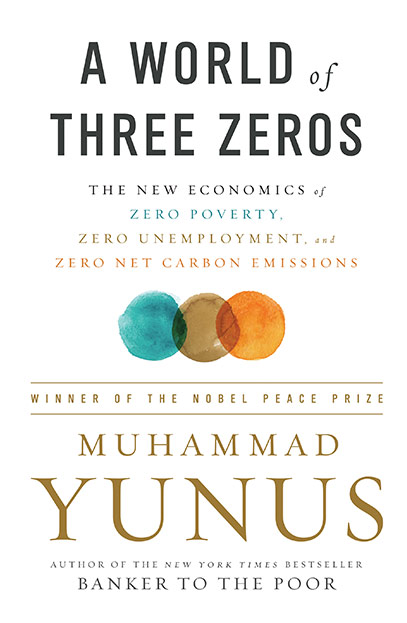- Shop
- A World of Three Zeros
A World of Three Zeros
The New Economics of Zero Poverty, Zero Unemployment, and Zero Net Carbon Emissions
https://uplbooks.com/shop/9789845062534-a-world-of-three-zeros-12085 https://uplbooks.com/web/image/product.template/12085/image_1920?unique=b656810
| Language: English |
Tags :
Book Info
Muhammad Yunus, who created microcredit, invented social business, and earned a Nobel Peace Prize for his work in alleviating poverty, is one of today’s most trenchant social critics. Now he declares it’s time to admit that the capitalist engine is broken—that in its current form, it inevitably leads to rampant inequality, massive unemployment, and environmental destruction. We need a new economic system that unleashes altruism as a creative force just as powerful as self-interest. Is this a pipe dream? Not at all. In the last decade, thousands of people and organizations have already embraced Yunus’s vision of a new form of capitalism, launching innovative social businesses designed to serve human needs rather than accumulate wealth. They are bringing solar energy to millions of homes in Bangladesh; turning thousands of unemployed young people into entrepreneurs through equity investments; financing female-owned businesses in cities across the United States; bringing mobility, shelter, and other services to the rural poor in France; and creating a global support network to help young entrepreneurs launch their start-ups. In A World of Three Zeros, Yunus describes the new civilization emerging from the economic experiments his work has helped inspire. He explains how global companies like McCain, Renault, Essilor, and Danone got involved with this new economic model through their own social action groups, describes the ingenious new financial tools now funding social businesses, and sketches the legal and regulatory changes needed to jump-start the next wave of socially driven innovations. He invites young people, business and political leaders, and ordinary citizens to join the movement and help create the better world we all dream of.

Muhammad Yunus
Muhammad Yunus, a native of Bangladesh, was educated at Dhaka University and was awarded a Fulbright scholarship to study economics at Vanderbilt University. In 1972, he became Head of the Economics Department at Chittagong University. He is the founder of Grameen Bank and the father of microcredit, an economic movement that has helped lift millions of families around the world out of poverty. He is also the creator of social business. Yunus and Grameen Bank are winners of the 2006 Nobel Peace Prize, and Yunus won the Presidential Medal of Freedom, 2009, and the Congressional Gold Medal, 2013. Alan Jolis, co-author of Banker to the Poor, is an American journalist and writer, now living in Sweden. His books



